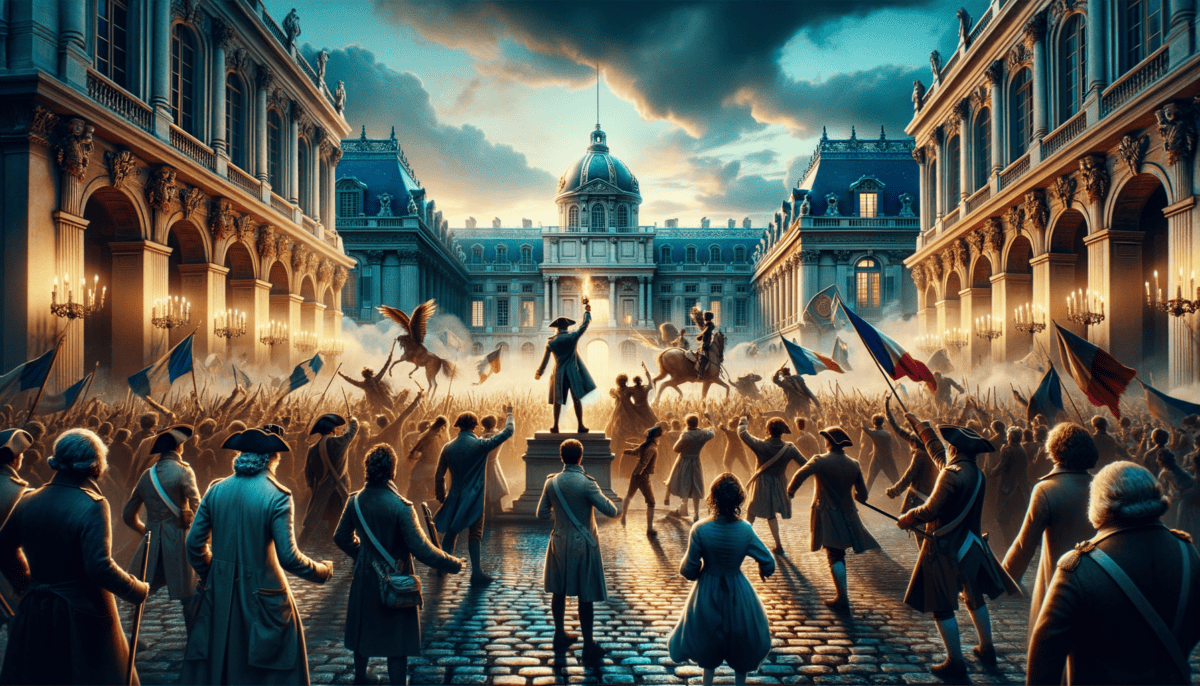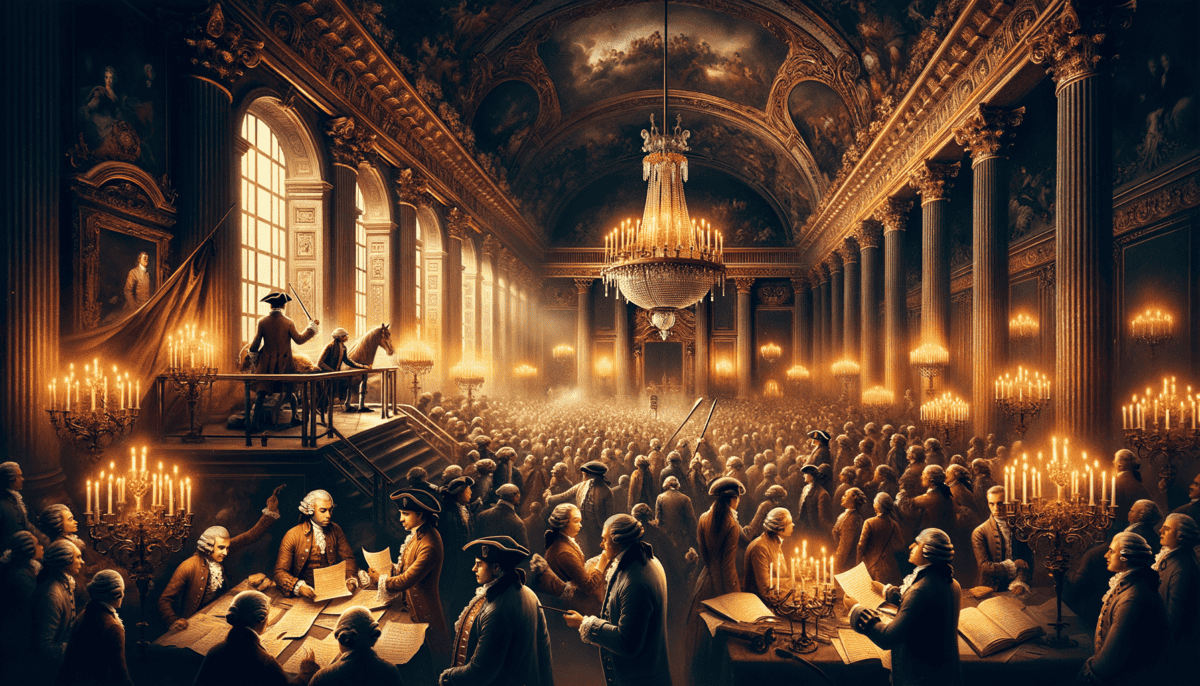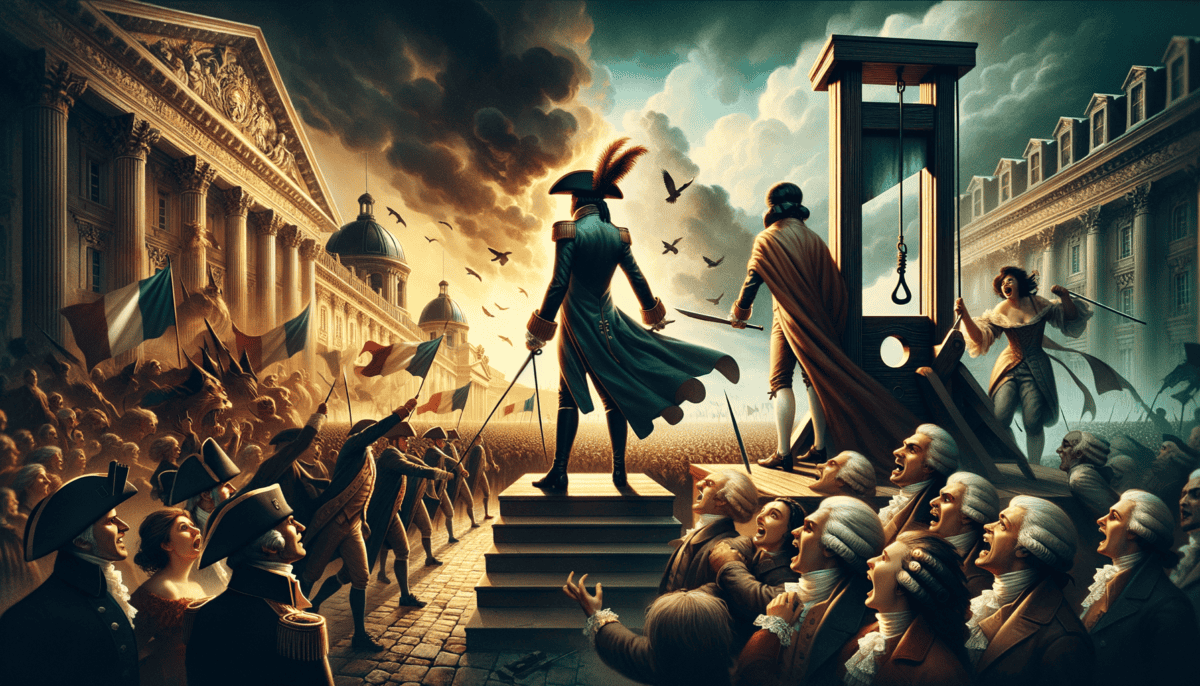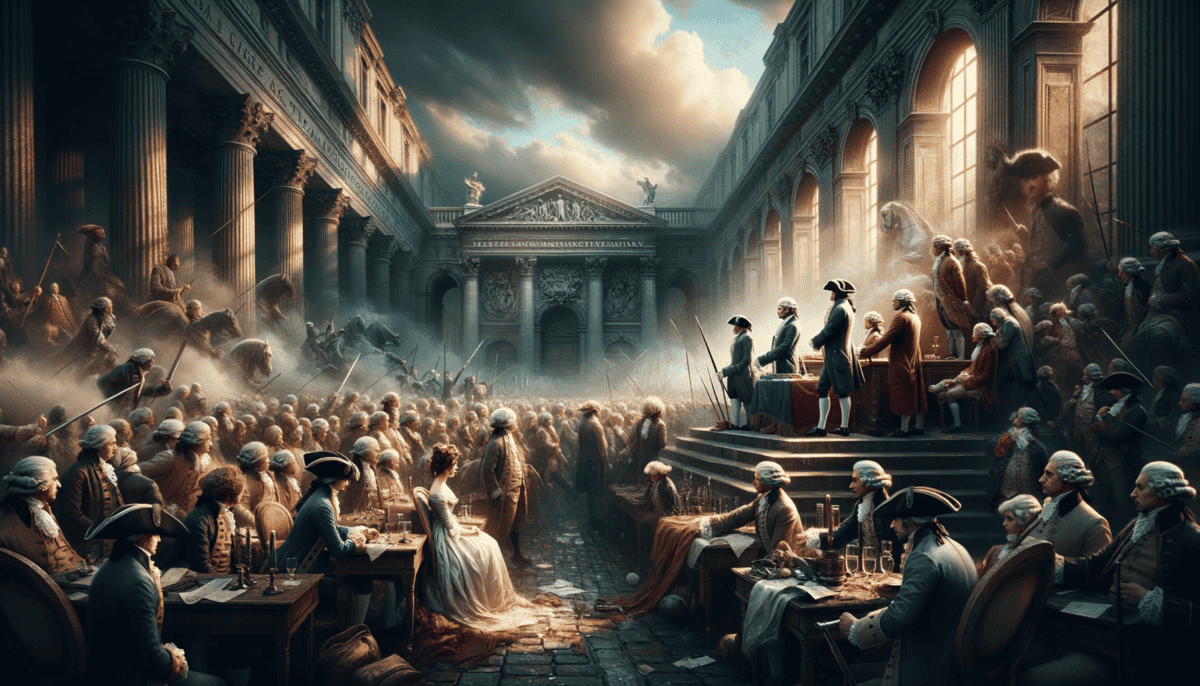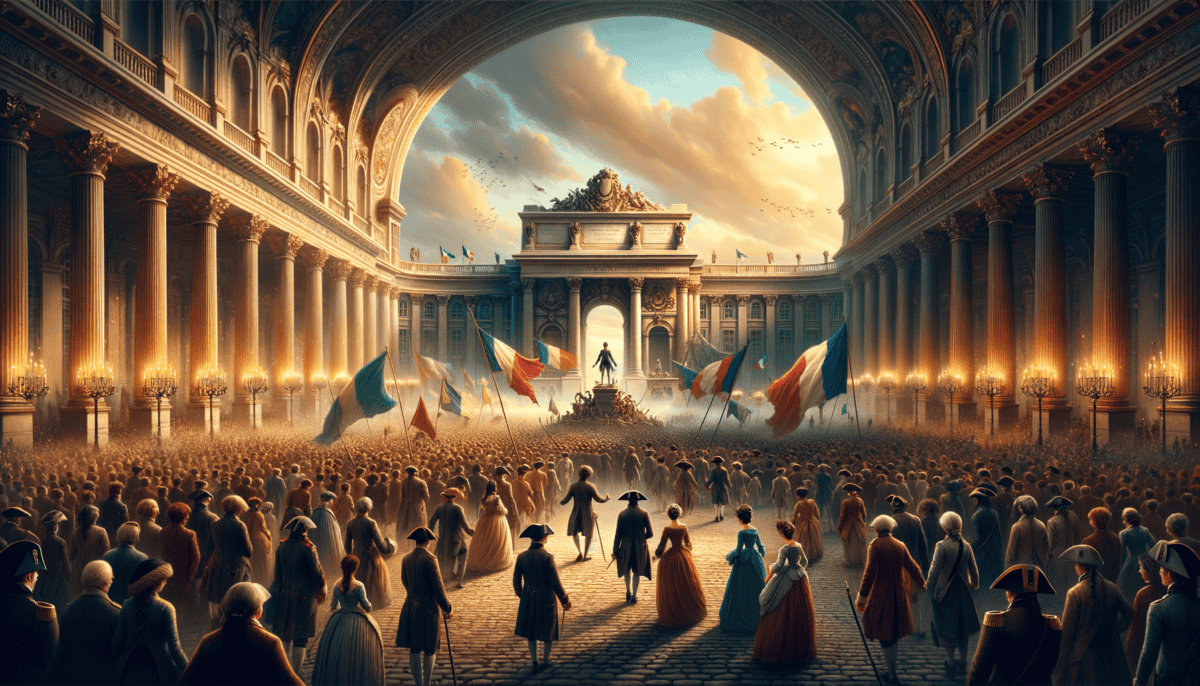The Broken Kingdom
Little Marie peeked through the bakery window, her tummy rumbling as she watched fresh bread cool on wooden shelves. The year was 1789, and the streets of Paris were not kind to children like her.
"Go away, you little rat!" the baker shouted, waving his rolling pin. Marie scurried away, her bare feet pattering on the cobblestones.
Just then, a grand carriage rolled by, splashing muddy water on Marie's torn dress. Through the window, she caught a glimpse of a noble lady wearing sparkly jewels and fancy clothes.
• The rich nobles who didn’t pay taxes
• The church leaders who owned lots of land
• The common people who did all the work and paid all the taxes
Far away from Paris, in a beautiful palace called Versailles, King Louis XVI and Queen Marie Antoinette lived like they were in a fairy tale.
"Your Majesty," said the royal cook, bowing low. "What shall we prepare for tonight's feast?"
"Oh, everything!" laughed the Queen, adjusting her tall wig. "And make sure there are plenty of cakes!"
But while the king and queen had parties every night, the people of France were getting angry. They didn't have enough food to eat, and their homes were cold and small.
Pierre, Marie's father, worked hard making shoes all day long, but still couldn't buy enough food for his family.
"Papa, why do we have to be so hungry?" Marie asked one night, as her father shared their small loaf of bread between five people.
Pierre looked sad. "Because, ma petite, the king takes all our money for taxes, but the rich nobles don't have to pay anything at all."
“It’s not fair!” little Marie declared, her fists clenched tight.
The weather that year made everything worse. It was so cold that the crops didn't grow well. The price of bread went up and up, until even working families couldn't afford to buy it.
In the narrow streets of Paris, people started whispering. They talked about change. They talked about fairness. They talked about something called "liberty."
"What's liberty, Papa?" Marie asked one evening.
Pierre smiled and pulled his daughter close. "Liberty means being free, my dear. Free to live a good life, to have enough food, and to be treated fairly."
That night, as Marie lay in her little bed, she could hear angry voices in the street. More and more people were getting tired of being hungry while the king and his friends lived like they were in a fairy tale.
The streets grew louder with each passing day. People gathered in groups, talking about rights and freedom. They started writing newspapers about their ideas. Some even dared to say that maybe France didn't need a king at all.
One evening, as Marie helped her father in his shoe shop, she noticed something different in the air. The usual smell of leather was mixed with excitement and worry.
"The time is coming," she heard a customer whisper to her father. "Soon, everything will change."
And change it would. The broken kingdom of France was about to learn a big lesson: when you ignore the hungry people for too long, they stop asking nicely for bread.
Little Marie didn't know it yet, but she was living at the start of one of the biggest changes in history. A change that would turn her world upside down and teach everyone – from the poorest street child to the king himself – that all people deserve to be treated fairly.
Sparks of Rebellion
The summer sun beat down on Paris as Marie watched a crowd gather in the town square. People were shouting and waving their fists in the air.
“Papa, what’s happening?” Marie tugged at her father’s sleeve.
“Something important, ma petite. The people are forming something called the National Assembly. They’re going to make new rules to help everyone, not just the rich.”
On a hot morning in July, Marie woke up to the sound of drums. People were marching through the streets with tools and sticks. Their faces looked determined.
“To the Bastille!” they shouted. “Free the prisoners!”
The Bastille was a big, scary prison with thick stone walls. It stood like a giant monster in the middle of Paris.
“Why are they going there, Papa?” Marie asked, watching from their window.
“The Bastille is where the king puts people who speak against him,” Pierre explained. “But more importantly, that’s where he keeps his weapons. The people are tired of being afraid.”
The next few hours were full of noise and excitement. BOOM! CRASH! The sounds of fighting echoed through the streets. Marie covered her ears, but she couldn’t help feeling excited too.
By sunset, something amazing had happened. The people had taken over the Bastille! The prison guards had given up, and the people were celebrating in the streets.
News spread fast through Paris. Children ran through the streets shouting:
“The Bastille has fallen! We are free! We are free!”
That night, Marie’s family had visitors. Their small home was packed with neighbors sharing bread and telling stories about the day’s events.
“Did you see how brave the people were?” one man said.
“And the guards just gave up!” another added.
Marie listened carefully as the grown-ups talked about changes coming to France. They used big words like “revolution” and “democracy,” but she understood the most important part: things were going to be different now.
The next few days were full of more exciting changes. People started wearing red, white, and blue ribbons – the new colors of freedom. They called each other “Citizen” instead of “Sir” or “Madame.”
Even at the palace of Versailles, things were changing. The king and queen weren’t having fancy parties anymore. They were scared because the people were so angry.
“What will happen to the king?” Marie asked her father one evening.
Pierre looked serious. “That’s what everyone is wondering, ma petite. But first, we must make sure all people have enough food and fair laws.”
The streets of Paris were different now. Where there had been quiet fear, now there was loud hope. People sang songs about freedom and marched together through the streets. They put up signs that said “Liberty, Equality, Fraternity” – words that meant everyone should be treated the same.
Marie noticed that even the baker who used to chase her away now gave out small pieces of bread to hungry children. “We must share what we have,” he said, “That’s what the revolution is all about.”
One morning, Marie found her father making a special pair of shoes.
“Who are those for, Papa?”
“These are for me, ma petite. I’m going to join the National Guard. We’re going to protect our new freedoms.”
Marie watched as her father polished the shoes until they shone. She could see how proud he was to be part of these big changes.
As summer turned to fall, more and more people joined the revolution. Women marched to Versailles to demand bread. Farmers stopped paying unfair taxes. Students wrote newspapers about freedom.
The spark that had started at the Bastille was growing into a bright flame of change. And little Marie, watching from her window, knew that she would never forget these amazing days when the people of France stood up and said “Enough!”
A New Kind of Freedom
The leaves were turning golden in Paris when Marie heard excited voices in the street. People were gathering around a man reading from a big piece of paper.
“Listen, citizens!” he called out. “We are writing new rules for France – The Declaration of the Rights of Man!”
“What does that mean, Papa?” Marie asked, standing on tiptoes to see better.
Pierre picked her up and sat her on his shoulders. “It means, ma petite, that from now on, everyone will be treated fairly. No more special rules for rich people.”
The crowd cheered as the man read more:
“All people are born free and equal in rights… These rights are liberty, property, safety, and resistance against unfair treatment.”
Marie noticed her friend Thomas jumping up and down nearby. His father had been a servant at the palace, but now he stood tall and proud in the crowd.
“Papa says I can go to school now!” Thomas told Marie excitedly. “Just like the rich kids!”
At home that evening, Marie’s mother was teaching her to read using a new book about rights and freedom.
“Mama, did you know how to read when you were little?” Marie asked.
“No, ma chérie. Girls weren’t allowed to learn then. But now…” Her mother smiled brightly. “Now everything is different.”
The next day, Marie saw people painting new signs on buildings. They wrote three special words:
LIBERTY • EQUALITY • FRATERNITY
These weren’t just pretty words – they were changing how people lived. Marie watched as her neighbor Madame Dubois opened her own little shop. Before, women weren’t allowed to own businesses.
“Would you like a fresh croissant?” Madame Dubois called out to Marie. “Now I can bake what I want, when I want!”
But not everyone was happy about the changes. Some rich nobles were leaving France, afraid of losing their special privileges. Marie saw fancy carriages rushing away from Paris at night.
“Why are they leaving?” she asked her father.
“Some people don’t like change,” Pierre explained gently. “They’re scared of losing their power. But we must keep working for what’s right.”
One morning, Marie found her mother writing a letter – something she’d never seen before.
“What are you writing, Mama?”
“I’m writing to the National Assembly,” her mother said proudly. “They’re asking what regular people think about the new laws. My opinion matters now!”
The streets were filled with new sounds: people debating ideas, reading newspapers aloud, and singing songs about freedom. Even children played new games, pretending to be citizens making laws.
Marie’s favorite was a song that went:
“Ah, it has come, it has come,
The time of liberty!
No more kings to tell us no,
We’re making history!”
At dinner, Pierre told stories about the meetings where they wrote the Declaration.
“We stayed up all night sometimes,” he said. “Everyone had ideas about what should be in it. We wanted to make sure it was perfect.”
Marie noticed that people walked differently now – with their heads held high. They weren’t afraid to look each other in the eye or speak their minds.
One day, she saw her teacher, Monsieur Bernard, tear up his old lesson books.
“Why are you doing that?” she asked.
“Because, little citizen,” he smiled, “we’re writing new ones. Books that tell the truth about how all people deserve respect and freedom.”
The air in Paris felt different – full of hope and possibility. Marie knew she was watching something incredible happen, something that would change France forever.
As autumn deepened, more changes came. But the biggest change was in the people themselves. They had found their voice, and they weren’t going to be quiet anymore.
Dark Days Dawn
The sunny days of hope began to fade as winter approached Paris. Marie noticed fewer smiles on the streets, and people spoke in whispers. A man named Robespierre was becoming very powerful.
“We must protect the revolution at all costs,” Robespierre’s voice boomed across the square. “Anyone who stands in our way is an enemy of France!”
Marie clutched her father’s hand tightly. “Papa, why does he sound so angry? I thought the revolution was about making people happy?”
Pierre knelt beside her, his face worried. “Sometimes, ma petite, people get scared of losing what they’ve gained. And scared people can do scary things.”
Marie’s old friend Thomas wasn’t allowed to play outside anymore. His mother kept him indoors after their neighbor was taken away for saying the wrong things.
“What happened to being free to speak our minds?” Marie asked her mother one evening.
Her mother sighed, stirring the soup slowly. “It’s complicated, chérie. Some people think we need strict rules to keep our new freedoms safe.”
The streets that once rang with happy songs now echoed with a different sound:
The rumble of cart wheels carrying prisoners
The sharp thud of the guillotine
The gasps of frightened crowds
Even children’s games changed. Instead of playing at making laws, they now whispered:
Watch what you do,
The Committee is watching,
They’re watching you!”
One morning, Marie found her mother burning her letters to the National Assembly.
“Why are you doing that, Mama?”
“Sometimes it’s safer to be quiet, my love. Even when we don’t want to be.”
The baker Madame Dubois closed her shop after being accused of charging too much for bread. Marie missed her warm croissants and friendly smile.
At school, Monsieur Bernard stopped teaching about rights and freedom. Instead, they learned about being “good citizens” and reporting “dangerous thoughts.”
“But what makes a thought dangerous?” Marie asked.
“Shh,” her friend Sophie whispered. “Don’t ask questions like that anymore.”
Each day, more people disappeared. The Committee said they were “enemies of the revolution,” but Marie remembered them as kind neighbors who had celebrated with everyone when the revolution began.
Robespierre appeared in the square again, his voice harder than ever:
“Terror is nothing other than justice, prompt, severe, inflexible!”
That night, Marie heard her parents talking in hushed voices:
“It’s not supposed to be like this,” her mother whispered.
“The revolution is eating its own children,” Pierre replied sadly.
Marie noticed how her father had stopped wearing his revolutionary cockade – the colorful ribbon that had once made him so proud. Now it stayed hidden in a drawer.
The city felt different again, but not like before. The air was heavy with fear instead of hope. People hurried through the streets with their heads down, avoiding eye contact.
One evening, Marie found an old copy of the Declaration of the Rights of Man hidden under her father’s mattress. She remembered how happy everyone had been when it was first read.
“Papa, will things ever be happy again?” she asked.
Pierre hugged her close. “Yes, ma petite. This is just a dark time. But remember – even in darkness, we must keep hope alive. The true spirit of liberty still lives in our hearts.”
As winter deepened, so did the shadow over Paris. But beneath the fear, people held onto their dreams of real freedom, waiting for the light to return.
The King’s Last Days
Snow fell softly on Paris as Marie watched from her window. The city was quiet now, but a different kind of quiet than before.
“Papa, why are there so many soldiers near the Temple tower?” Marie asked, pointing to the dark building in the distance.
Pierre drew his daughter close. “The king and queen are there now. They’re not at their pretty palace anymore.”
Marie remembered seeing the royal family brought to Paris in a cart, so different from their fancy carriages. The queen’s hair had turned white, and the little prince clung to his mother’s skirts.
“Even kings must answer to the people now,” her father explained gently.
The trial began on a cold December morning. Marie could feel the tension in the streets as people gathered to hear the news:
“But he’s still our king!”
“Not anymore – France is free!”
Every day brought new whispers and arguments. Some people felt sad for the king, while others wanted him punished.
“Mama, what will happen to the little prince?” Marie asked one evening.
Her mother’s eyes filled with tears. “Some things are hard for even grown-ups to understand, chérie.”
The winter grew colder
The debates grew louder
The future grew darker
Then came the day of the vote. Marie watched her father leave for the National Convention, his face grave.
“We must vote according to our conscience,” he told her mother. “But whatever we choose will change France forever.”
That night, Pierre returned home looking older than Marie had ever seen him. “The king has been found guilty,” he said quietly.
Marie wasn’t allowed to go outside that day, but she could hear the drums in the distance. Her mother kept her busy with chores, but she noticed how her parents’ hands trembled.
“Will this make France better?” Marie asked that evening.
“Oh, my sweet child,” her father sighed. “Sometimes the path to a better future has many sad turns.”
The queen remained in the Temple tower with her children, but not for long. By autumn, she too faced trial. Marie watched more crowds gather, more arguments break out:
Others remembered her as their queen
Many just wanted peace at last
On October 16, another drum roll echoed through Paris. Marie stayed home again, helping her mother bake bread. But she noticed how the dough was salty with her mother’s tears.
That night, she found her old toy crown from happier days. “What should I do with it, Papa?”
Pierre held the little crown thoughtfully. “Keep it, ma petite. Let it remind you that power should come from the people’s hearts, not just from fancy crowns.”
The royal children remained in the Temple tower. Sometimes Marie caught glimpses of the young prince at the window, but he looked so different now – pale and sad.
As winter returned to Paris, the city felt changed again. The revolution had shown that no one – not even kings and queens – was above the law. But the price of this lesson weighed heavily on everyone’s hearts.
Pierre gathered his family close that evening. “Remember this time,” he said softly. “France is writing a new story, and every page matters – even the sad ones.”
Outside, snow continued to fall on the changed city, covering both palaces and prisons in the same soft white blanket.
A New Dawn for France
Spring bloomed in Paris, bringing fresh hope. Marie watched as colorful flowers pushed through the soil, just like new ideas were growing in France.
“Look, Papa! Even the gardens are changing,” Marie exclaimed, pointing to the community garden where fancy royal flowers had been replaced by vegetables.
A tall young general named Napoleon was becoming very popular. Marie often heard his name in the streets:
“He understands what France needs!”
“Finally, someone who can lead us forward!”
Pierre watched these changes with mixed feelings. “Sometimes change comes like a storm, ma petite. First thunder and lightning, then clean fresh air.”
Marie noticed how different life was becoming. Schools were teaching new things, and more children could go to class. Even girls like her had more chances to learn!
• People had more rights
• Everyone was equal under law
• More children could go to school
• Regular people could help make decisions
One sunny morning, Marie found her father reading a new book. “What’s that, Papa?”
“It’s about our rights – things that belong to every person, no matter if they’re rich or poor. The revolution helped us understand these important ideas.”
Freedom grew stronger
Hope spread wider
Dreams reached higher
People from other countries started visiting France to learn about these new ideas. Marie loved listening to their different languages in the streets.
“Our revolution is like a candle,” her father explained. “Its light spreads far beyond France, showing others the way to freedom.”
Napoleon became more powerful, eventually becoming Emperor. But things were different now – his power came from the people, not just from being born special.
Years later, Marie sat in her garden with her own children. “Tell us about the revolution, Maman,” they begged.
She held her old toy crown, now tarnished with age. “It was a time when France learned that every person matters. We learned that working together, people can make the world better.”
The children listened wide-eyed as she continued, “Sometimes change is hard, but it’s like planting a garden. First comes the difficult work of preparing the soil, then the long wait for seeds to grow. But in the end, beautiful flowers bloom.”
Marie watched her children play freely in the garden, knowing they would grow up in a different France than she had known – a France where dreams of liberty, equality, and brotherhood had taken root and flourished.
“And that,” she told them, smiling at the setting sun, “is how France became a place where everyone’s voice matters, where people work together to make things better, and where hope grows stronger every day.”
As twilight painted the sky in beautiful colors, Marie knew that the story of the revolution would live on, teaching future generations that when people stand together for what’s right, amazing changes can happen.


